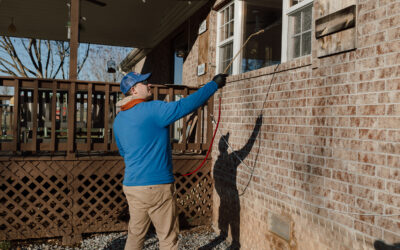
Summer Pest Control | Everyday Ways to Prevent Pest Problems
No one likes having pests in their home. Whether you’re watching TV and being bothered by moths or spiders, or you are trying to sleep but hear the sound of feet in the ceiling, knowing you have pests in the house is unnerving and frustrating.
Of course, pests do their best not to get caught because they want to continue being your roommates. Fortunately, there are simple steps you can take every day that can help with summer pest control. Here are some tips.
Pay Attention to Entry Points
As you do work around your home and yard this summer, take the time to look carefully at places where pests might get in. For instance, notice where utility pipes enter the home. Is that area sealed? Are the window and doors well sealed?
Also make sure that pests cannot get into your home through cracks or gaps in siding, problems with the chimney or roof shingles, or other small openings.
Finally, be sure you inspect vents. You want to cover these openings or use screens to keep birds from nesting in them. They can also be an entry point for rodents or other larger pests.
Simply noticing and fixing entry points can be a very effective form of summer pest control!
Keep Wood Away From Your Home
Wood is a tasty treat for termites and a great place to nest for a host of other animals. You don’t want any of these wood pile residents to find their way into your home, so keep wood away from the house.
Store all fire wood at least 20 feet away from the house. Those wood piles are an easy transit for pests to come into the house if you store them up against the wall or near the foundation. You should also watch out for less obvious sources of wood, like mulch. Mulch should be at least 15 feet from the house’s foundation.
When you keep wood away, you won’t be rolling out the red carpet for wood-based pests to get into the house. It’ll make your summer pest control much easier.
Seal Your Garbage Bins
As you have probably heard, all kinds of animals love getting into our garbage. If you have unsealed garbage near your home, you’re inviting rodents, neighborhood dogs, and even bears to come right up to your door.
There are a lot of DIY solutions that may or may not work to keep animals out of the trash, but one thing that definitely makes a difference is keeping the bin tightly sealed. Use bungee cords, even crisscrossed, to keep the lid securely fastened.
You don’t need animals in your trash or garbage spread across your yard. Keep your bins inaccessible or tightly tied shut and you’ll have far fewer problems.
Contact a Professional for Summer Pest Control
Not all summer pest control can be easily done yourself. Sealing entrances, keep wood away from your home, and sealing garbage are all important steps, but in the end you also need help from the pros.
A professional can inspect your property to see if you have common pest problems. If you do, we can suggest a treatment plan and put it in place. We also adjust for common concerns so that your children, guests, and pets all stay safe.
Are you ready to get help with your summer pest control? Contact us today for a free consultation.
More posts from West Termite, Pest & Lawn
Pestproofing Entry Points Before Spring
As spring approaches in Arkansas, homeowners face an increased risk of pests seeking warmth, food, and shelter. Many infestations begin with small, unnoticed entry points that allow insects, rodents, and other pests to move indoors. Pestproofing your home before the...
Early Spring Termite Activity in Arkansas
As Arkansas begins to warm in early spring, homeowners may assume termites remain dormant until the summer months. In reality, spring termite colonies can become active much earlier, especially as soil temperatures rise and moisture levels increase. Subterranean and...
Preparing Your Home for Early Spring Pests
As winter fades and temperatures rise in Arkansas, homes become vulnerable to a fresh wave of early spring pests. Early spring is a critical time to take preventive action because insects, rodents, and other pests start emerging from dormancy, seeking food, warmth,...



